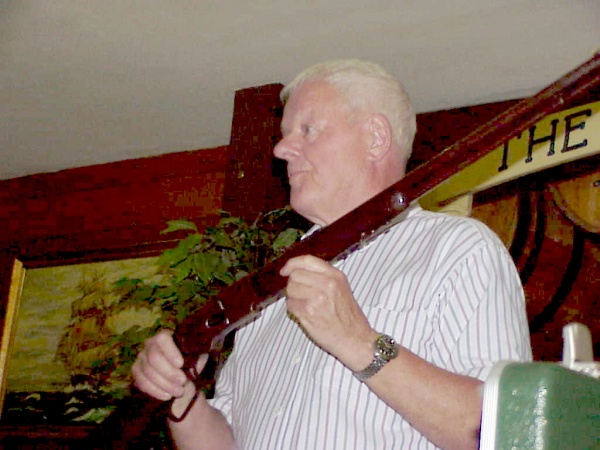Frank Wright, a long-time mutual friend of Mr. Cotter and I wrote this piece. It reminds me of the final scene at the cemetery in Saving Private Ryan.
I knew bits and pieces of this story, but never the whole thing.
Wow. What an incredible man.

by Frank Wright
Bill Cotter passed away Saturday, February 9th, age eighty-three. He was a semi-retired project/engineering manager.
Born in the Bronx, he never did really learn to speak English like a native.
Bill was among the most competent, capable, respect(-ed, -able, -ful, …) men I’ve ever known. He was a hunter, collector, handloader, former peace officer and father of four.
As a teen, right after WWII, he didn’t have a “real” job, so ever the leader, he got a bunch of his buddies to enlist with him in the National Guard (Fighting 79th). He said he was given a choice: occupied Germany or Japan.
Hmmm. Bratwurst or Geishas?
It was off to Tokyo!
About the time they arrived, there was this little problem in Korea. Diverted to the peninsula, they arrived ill-equipped, largely ill-trained, and without an apparent plan.
His group was about the first to arrive.
The Chinese, of course, wanted to make exemplary quick work of them.
Bill, the teen, by choice was in a (heavy) weapons unit. (Think medium and heavy machineguns, mostly.) His guys were deployed along a thin line in mountainous terrain and told to hold. There was no one else.
At this point, they were subjected to the early human-wave tactics of the Chinese.
They could hear the Chinese marshaling behind the hills. And at an instant, there were screams and whistles. Then the whole of the terrain in front seemed to rise up and run toward the line.
Bill said they all knew there was NO way the wave could be stopped – and the Chinese knew this as well.
Bill’s Americans opened up as soon as individual enemy were identifiable.
They fired continuously, until their ammunition was exhausted, burning up their guns.
Just as they ran out of ammo, the Chinese ran out of bodies. Some made it up to the line. A few penetrated the line and were engaged at contact distances. There were heavy American casualties.
Bill, now haven risen slightly higher up the chain of command, was straining every fiber of his 19-year-old frame to resupply barrels and linked ammo to his guns.
The lightly wounded tried to help the helpable, while riflemen scurried to rearrange freshly-dead Chinese to raise the height of the emplacements, to offer a little more protection from rifle fire.
Nothing protected them against the mortars.
The surviving GIs could still hear heavy commotion behind the hills.
Before repair and supply was completed, it happened again. Rearming continued under heavy fire, only this time there were many fewer Americans, but seemingly endless screaming Chinese.
However, the open running/ground in front of the line was no longer “open”. The second wave had to stumble, jump and clamor over the first wave and were considerably slower in their approach. Once again, ammo was exhausted just as was the supply of Chinese.
Fewer made it to the line, which was now more of a membrane. Again, there were terrible, heavy American losses.
Bill said they again burned up their guns. Guns with remaining ammo kept firing without the gunners — cooking-off until they ran dry or someone twisted the belts to jam them.
This scenario was repeated; Bill was uncertain how many times. No food, little water, practically no medical support and no evacuation, and now no reinforcements or resupply. Alone.
Bill said mortally wounded kids, with no medics, were seen to drag themselves back behind their rifles and fire until, sometime between clips or belts, they just weren’t there anymore.
Again, they heard the great tumult behind the hill. They cussed, prayed, said their goodbyes and readied themselves.
And, the Chinese?
They just left.
Then nothing.
Bill said that of his original “nuclear” group, the guys he knew well and had trained with (I don’t know the number), only he and one other were left.
I ask if many finally made it back to the States (with the “million dollar wound”). I was astonished when he said, “No, they were all dead.”
I truly believe that Bill was was a conspicuously decent man because he was living for kids that never got to be men chronologically.
To the best of my knowledge, he never told this to his family. None of his kids related that he talked much about the war.
We buried him yesterday.
I knew that Bill was a combat vet, but he only related these details to me during a long car ride, after I’d mentioned to him how terribly scared I was for warrior son Chris, who was then (again) in Afghanistan, he talked uninterrupted, for quite a while.
He was dewey-eyed and took on that “thousand-yard” stare. I was hugely impressed – mostly because I’d never seen Bill emotional (and somewhat because the 70-plus-year-old was then hurtling down the interstate with me strapped helplessly in the passenger seat…)
Kids, call your grandpa…
I don’t think that I ever had the pleasure of meeting Mr. Cotter, but this story brought me to tears. We are losing our history and hero’s too often as of late. Again, my thoughts and prayers with his family and the GSL family that he was part of.
RIP, Sir.
Bill was such a gentleman. It was a true pleasure to work with him when we both served on the GSL Board together. I will truly miss him. Seems like so many good people are dying off and so many a$$holes are taking their place (NOT within GSL, just in general). Truly one of “The Greatest Generation”. So sad on so many levels. RIP my brother.